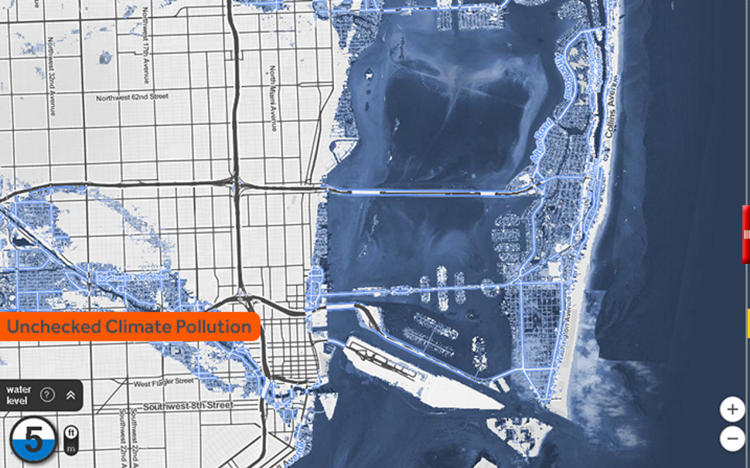By the end of the century, if greenhouse gas emissions continue unchecked, Fenway Park, along with a huge chunk of the rest of Boston, could end up underwater. Miami Beach might be submerged. The same is true for parts of every coastal city, from Hong Kong to Mumbai.
Cities may start to drown much faster than expected because sea levels could rise much faster than expected—mostly thanks to the way that Antarctica could fall apart and melt.
In 2013, experts thought the worst-case scenario in 2100 would be about three feet of sea level rise. But a new study in Nature suggests that the water could rise about twice as much. Combined with melting ice from other parts of the world, total sea level rise could reach five to six feet. By 2500, the ocean could rise almost 50 feet.
The new computer model adds two important details that previous modeling didn't include. As snow melts on the surface, water will run into cracks in the ice, force the cracks open, and break the ice shelf apart. (That's already happened to the Larsen B ice shelf, which is falling apart and may disappear completely within a few years). Then, as floating ice disappears, the tall ice cliffs that remain won't have enough support to stand.
"They'll just crumble under their own weight," says David Pollard, senior scientist at the Earth and Environmental Systems Institute at Penn State and co-author of the new study. "The ice won't be strong enough to hold them up. That will cause very, very rapid—miles per year—of retreat into the interior."
Pollard says the mechanisms in the new model are "simple and crude" at this point, and should spur more detailed studies. But the model is a breakthrough: A similarly huge sea level rise happened three million years ago, but until this study, researchers weren't able to recreate how it had happened.
Though the researchers didn't look at how specific cities would be impacted by the potential rise in sea level, Climate Central took the projections and mapped out what it might look like in a few places, using both local and global data. You can see a whole map of the U.S. here
Every coastal city is at risk. "If it really happens—which hopefully it won't, and we'll avoid these business-as-usual scenarios—if 15 meters of sea level rise, average over the world, happens, there's not one place where it would just stay zero," says Pollard. "There would be drastic rises everywhere."
There's some good news in all of this: The model suggests that if humanity dramatically cuts emissions, at or beyond the amount proposed at the Paris climate talks, Antarctica still has a chance of remaining stable.
"Other studies suggest that it's already started retreat, even from the ocean warming up to today, and we're past the point of no return," Pollard says. "But that's a very hard thing to nail down. Our model doesn't say that. It says we've not quite reached that point. So if we drastically reduce greenhouse gas emissions, we'll avoid it."
Cover photo: Bernhard Lang/Getty Images
